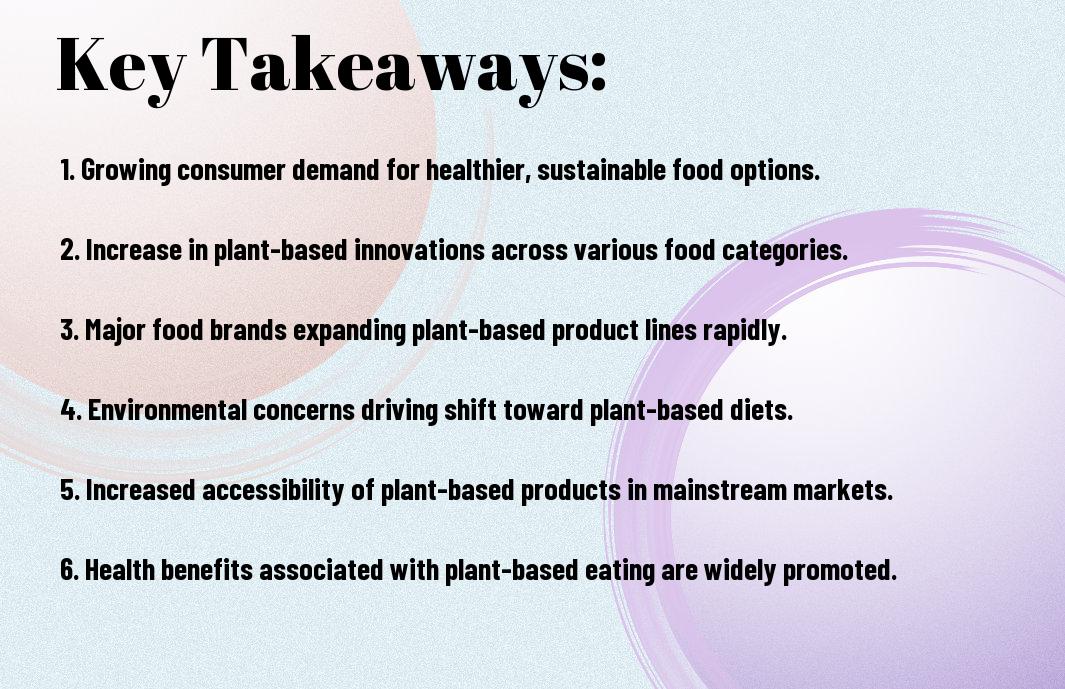- The growth of plant-based products is driven by increasing consumer demand for healthy and sustainable food options, with many consumers opting for a flexitarian diet.
- The food industry is responding to this trend by developing innovative plant-based alternatives to traditional animal-based products, such as meat substitutes and dairy-free products.
- The environmental benefits of plant-based products, including reduced greenhouse gas emissions and conservation of natural resources, are also driving their adoption and are expected to contribute to a more sustainable food system in the future.

Market Trends
For instance, you’ve likely noticed the surge in plant-based products on store shelves, and this trend is expected to continue as consumers become more health-conscious and environmentally aware.
Growing Demand for Plant-Based Products
Furthermore, you’ll find that the demand for plant-based products is on the rise, driven by your increasing interest in sustainable and healthy living.
Increasing Availability of Plant-Based Alternatives
Similarly, products like plant-based milk and meat alternatives are becoming more mainstream, making it easier for you to incorporate them into your diet.
Availability of these alternatives is expanding rapidly, allowing you to choose from a wide range of options that cater to your tastes and preferences, and you can expect to see even more innovative products in the future.
Health Benefits
If you’re considering a shift to plant-based products, you’ll be pleased to know that they offer numerous advantages.
Reduced Risk of Chronic Diseases
Prior to making the switch, you may have been at a higher risk of developing chronic diseases, but plant-based products can help mitigate this risk, leading to a healthier you.
Improved Nutritional Profile
Diseases caused by poor nutrition can be alleviated with plant-based products, which provide your body with the necessary nutrients, vitamins, and minerals for optimal health, allowing you to feel more energized and focused.
Another advantage of plant-based products is that they often have an improved nutritional profile, with higher levels of fiber, antioxidants, and other beneficial compounds, which can help support your overall well-being and provide you with a sense of vitality and renewed health.

Environmental Impact
Not surprisingly, the shift towards plant-based products has significant benefits for the planet, and as you consider your role in this movement, you’ll find that your choices can greatly impact the environment.
Reduced Greenhouse Gas Emissions
Towards a more sustainable future, you’ll find that plant-based products contribute to reduced greenhouse gas emissions, allowing you to make a positive impact on the planet with your daily choices.
Conservation of Natural Resources
Approximately, any efforts you make to adopt plant-based products will help conserve natural resources, such as water and land, which are often depleted by animal agriculture, and as you make these choices, you’ll be supporting a more environmentally friendly food system.
Emissions from animal agriculture are significantly reduced when you opt for plant-based products, and this, in turn, helps to conserve natural resources, allowing you to make a difference in preserving the planet’s precious resources for future generations, and as you continue to make informed choices, you’ll find that your actions can have a profound impact on the health of the planet.
Food Technology Advancements
Many factors have contributed to the growth of the plant-based industry, and advancements in food technology have played a significant role in this trend. You can see this in the development of new products and manufacturing processes that make plant-based options more appealing and accessible to you.
Development of Plant-Based Meat Alternatives
Almost any food product can now be replicated using plant-based ingredients, allowing you to enjoy your favorite foods while adhering to a plant-based diet. You will find that plant-based meat alternatives are becoming increasingly popular, with many companies investing in this area.
Innovation in Dairy-Free Products
Anything is possible in the world of dairy-free products, and you are now spoilt for choice when it comes to milk alternatives and other dairy-free options. You can choose from a variety of products that cater to your dietary needs and preferences.
DairyFree options have come a long way, and you can now find a wide range of products that are not only delicious but also nutritious. You will notice that many dairy-free products are fortified with important vitamins and minerals, making them a great alternative to traditional dairy products. As you explore the world of plant-based products, you will discover that dairy-free options are no longer a compromise on taste or quality, but a viable and appealing choice for your dietary needs.
Consumer Behavior
All aspects of your life, including your dietary habits, are influenced by the rise of plant-based products. You are likely to notice the impact on your daily food choices and purchasing decisions.
Changing Attitudes towards Plant-Based Diets
Across various demographics, you see a shift in attitudes towards plant-based diets, with more individuals adopting this lifestyle for health and environmental reasons, affecting your perception of food and nutrition.
Influence of Social Media on Food Choices
Prior to making a purchase, you often browse social media platforms, where influencers and bloggers showcase plant-based products, shaping your opinions and preferences, and ultimately, your food choices.
Understanding the influence of social media on your food choices can help you make informed decisions about the products you buy and consume, as you are constantly exposed to information and reviews from various online sources, guiding your selection of plant-based products and shaping your eating habits.
Challenges and Opportunities
Your journey into the world of plant-based products presents a complex landscape, full of obstacles and incentives. As you explore deeper, you will encounter various challenges, but also numerous opportunities for growth and innovation.
Overcoming Taste and Texture Barriers
Prior to making a switch, you may find that plant-based products lack the taste and texture of their traditional counterparts. However, manufacturers are working tirelessly to bridge this gap, creating products that are increasingly similar to their animal-derived equivalents.
Expanding Plant-Based Product Offerings
Primarily, product development in the plant-based sector is focused on creating alternatives to traditional staples. You will find a wide range of options, from plant-based milk to meat substitutes, all designed to mimic the taste and texture of their traditional counterparts.
Consequently, as you explore the expanding plant-based product offerings, you will notice a significant improvement in quality and diversity. You can expect to find products that not only taste great but also offer a range of health benefits, making it easier for you to make the switch to a plant-based lifestyle.
To wrap up
Taking this into account, you see the significant growth of plant-based products as a shift in your daily life. You notice the increasing variety of options available, from food to cosmetics. Your choices now reflect a more sustainable and compassionate lifestyle, influenced by the rise of plant-based products, and you can expect this trend to continue shaping your consumer habits in the years to come.
FAQ
Q: What is driving the rise of plant-based products in the market?
A: The rise of plant-based products is driven by increasing consumer awareness about the health benefits and environmental sustainability of plant-based diets. Many consumers are adopting flexitarian or vegan lifestyles, leading to a surge in demand for plant-based alternatives to traditional animal-based products. Additionally, advances in food technology have made it possible to create plant-based products that are comparable in taste, texture, and quality to their animal-based counterparts.
Q: What are the benefits of choosing plant-based products over traditional animal-based products?
A: Plant-based products offer several benefits, including reduced environmental impact, improved health outcomes, and increased food safety. Animal agriculture is a significant contributor to greenhouse gas emissions and deforestation, whereas plant-based products tend to have a lower carbon footprint. Plant-based diets have also been linked to lower rates of chronic diseases, such as heart disease and diabetes. Furthermore, plant-based products are often lower in saturated fats, cholesterol, and calories, making them a popular choice for health-conscious consumers.
Q: Are plant-based products more expensive than traditional animal-based products?
A: The cost of plant-based products can vary depending on the type of product, brand, and production methods. While some plant-based products may be more expensive than their animal-based counterparts, many affordable options are now available in the market. As demand for plant-based products continues to grow, economies of scale are improving, and prices are becoming more competitive. Moreover, the long-term health benefits and environmental sustainability of plant-based products can lead to cost savings in the long run.
Q: How can I incorporate more plant-based products into my diet and lifestyle?
A: Incorporating more plant-based products into your diet and lifestyle can be easy and delicious. Start by experimenting with different types of plant-based milk, such as almond, soy, or oat milk, and try plant-based meat alternatives, like tofu, tempeh, or seitan. You can also explore plant-based protein sources, such as legumes, beans, and lentils, and try plant-based snack options, like nuts, seeds, and fruit. Many restaurants and food establishments now offer plant-based options, making it easier to dine out while following a plant-based diet.
Q: What is the future outlook for the plant-based products industry, and what can we expect in terms of innovation and growth?
A: The plant-based products industry is expected to continue growing rapidly, driven by increasing consumer demand and advances in food technology. We can expect to see more innovative and affordable plant-based products entering the market, including plant-based dairy alternatives, plant-based eggs, and plant-based meat products. The industry is also likely to see more investment in research and development, leading to improved product quality, taste, and texture. As consumer awareness and education about the benefits of plant-based products continue to grow, the industry is poised for significant expansion and innovation in the coming years.

